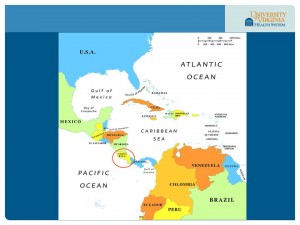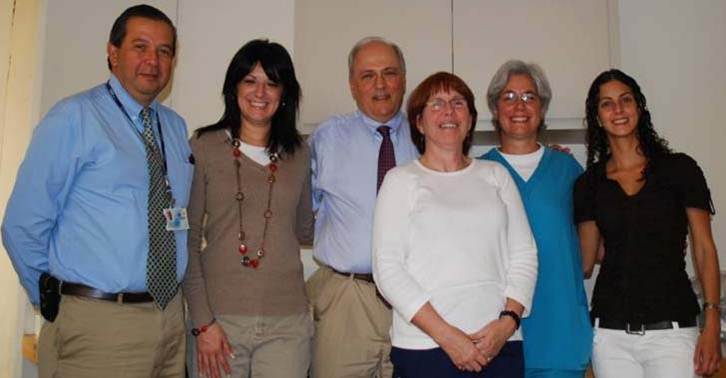Peter W. Heymann, MD
 The Heymann laboratory is part of the Division of Pediatric Respiratory Medicine and has been devoted to improving the care of children with asthma through clinical and basic research. The main objective of the Heymann laboratory has been to decipher the relationship between viral infections and allergic inflammation as the main causes of asthma exacerbations in children, as well as in young adults. Early work from Dr. Heymann’s research group involved cross-sectional studies of actively wheezing children who required treatment in the University of Virginia Hospital and in the emergency room. In these studies, the enrollment investigators were blinded as to whether the wheezing children were atopic (allergic) or infected with virus at the time of treatment for their acute attack. More recently, Dr. Heymann and his colleagues have done similar studies in Costa Rica (see figures), a country located in Central America near the equator. Costa Rica has a tropical climate, different environmental exposures (dominated by dust mite allergen exposure), and has a prevalence of asthma that is 2-fold higher than in the United States. Taken together, these investigations have demonstrated that virus-induced wheezing is common in the pediatric population and is most strongly associated with infections caused by rhinovirus (RV; also known as the “common cold virus”) after three years of age. More specifically, the results of this research have also shown that over 90% of children treated for wheezing induced by RV in the hospital or emergency room are atopic. In addition, there is now compelling data from Dr. Heymann’s research group indicating that the combination of an RV infection and allergen-induced airway inflammation act synergistically to provoke an attack of asthma, and that the risk for wheezing triggered by RV is significantly associated with strong allergy antibody (IgE) responses in serum, predominantly to dust mite allergen in Costa Rica.
The Heymann laboratory is part of the Division of Pediatric Respiratory Medicine and has been devoted to improving the care of children with asthma through clinical and basic research. The main objective of the Heymann laboratory has been to decipher the relationship between viral infections and allergic inflammation as the main causes of asthma exacerbations in children, as well as in young adults. Early work from Dr. Heymann’s research group involved cross-sectional studies of actively wheezing children who required treatment in the University of Virginia Hospital and in the emergency room. In these studies, the enrollment investigators were blinded as to whether the wheezing children were atopic (allergic) or infected with virus at the time of treatment for their acute attack. More recently, Dr. Heymann and his colleagues have done similar studies in Costa Rica (see figures), a country located in Central America near the equator. Costa Rica has a tropical climate, different environmental exposures (dominated by dust mite allergen exposure), and has a prevalence of asthma that is 2-fold higher than in the United States. Taken together, these investigations have demonstrated that virus-induced wheezing is common in the pediatric population and is most strongly associated with infections caused by rhinovirus (RV; also known as the “common cold virus”) after three years of age. More specifically, the results of this research have also shown that over 90% of children treated for wheezing induced by RV in the hospital or emergency room are atopic. In addition, there is now compelling data from Dr. Heymann’s research group indicating that the combination of an RV infection and allergen-induced airway inflammation act synergistically to provoke an attack of asthma, and that the risk for wheezing triggered by RV is significantly associated with strong allergy antibody (IgE) responses in serum, predominantly to dust mite allergen in Costa Rica.

Currently, Dr. Heymann and his colleagues have been using an experimental RV infection challenge model to 1) test the hypothesis that allergic inflammation plays a central role in the pathogenesis of asthma exacerbations caused by RV, and 2) explore mechanisms involved in the asthmatic response to RV in greater detail. This experimental model is the only study design available for monitoring the response to RV prior to and following virus inoculation, including the sequence of events during the early (innate) phase of the infection, during peak symptoms and during symptom resolution. Using this model, the Heymann group of investigators at UVA have become leaders in the evaluation of upper and lower respiratory tract symptoms, in the assessment of lung function, and in the collection of blood and nasal wash samples needed for cellular and molecular evaluations of the immune system which can be done safely during the infection in young adults who have mild asthma. Current NIH funding is allowing the Heymann research team to employ the RV infection model to provide an even more comprehensive understanding of how allergic inflammation influences the immune response to RV. Together with studies planned in the hospital and emergency room at UVA and in Costa Rica, these investigations will guide the development of new therapies to decrease asthma attacks caused by the combination of RV infections and allergic inflammation in the pediatric population.
 Costa Rica Research Team includes investigators from
Costa Rica Research Team includes investigators from
the University of Virginia and the Hospital Nacionale de Niños in San José,
the main tertiary care center for sick children in Costa Rica.
Contact Information:
Phone: 434-982-3654
Email: PWH5A@virginia.edu
